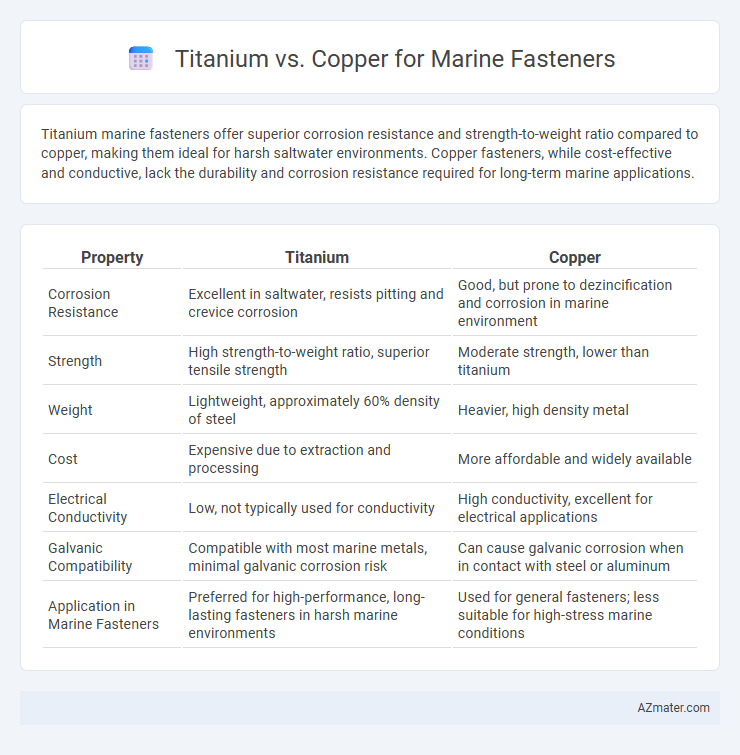Titanium marine fasteners offer superior corrosion resistance and strength-to-weight ratio compared to copper, making them ideal for harsh saltwater environments. Copper fasteners, while cost-effective and conductive, lack the durability and corrosion resistance required for long-term marine applications.
Table of Comparison
| Property | Titanium | Copper |
|---|---|---|
| Corrosion Resistance | Excellent in saltwater, resists pitting and crevice corrosion | Good, but prone to dezincification and corrosion in marine environment |
| Strength | High strength-to-weight ratio, superior tensile strength | Moderate strength, lower than titanium |
| Weight | Lightweight, approximately 60% density of steel | Heavier, high density metal |
| Cost | Expensive due to extraction and processing | More affordable and widely available |
| Electrical Conductivity | Low, not typically used for conductivity | High conductivity, excellent for electrical applications |
| Galvanic Compatibility | Compatible with most marine metals, minimal galvanic corrosion risk | Can cause galvanic corrosion when in contact with steel or aluminum |
| Application in Marine Fasteners | Preferred for high-performance, long-lasting fasteners in harsh marine environments | Used for general fasteners; less suitable for high-stress marine conditions |
Introduction to Marine Fasteners
Marine fasteners are critical components designed to withstand harsh saltwater environments while providing secure and durable connections. Titanium offers superior corrosion resistance and a high strength-to-weight ratio, making it ideal for marine fasteners exposed to seawater. Copper fasteners provide good corrosion resistance and conductivity but are more susceptible to galvanic corrosion compared to titanium in marine applications.
Importance of Material Selection in Marine Environments
Material selection in marine environments critically impacts the durability and performance of fasteners, where titanium and copper present contrasting advantages. Titanium fasteners offer superior corrosion resistance against seawater-induced oxidation and biocorrosion, ensuring long-term structural integrity and minimal maintenance. Copper fasteners, while cost-effective, are prone to galvanic corrosion when in contact with other metals, making titanium the preferred choice for high-strength, corrosion-resistant marine applications.
Overview of Titanium Fasteners
Titanium fasteners offer exceptional corrosion resistance, making them ideal for marine environments where exposure to saltwater causes rapid deterioration of traditional metals. Their high strength-to-weight ratio ensures durability and longevity without adding significant weight to marine structures. Compared to copper fasteners, titanium provides superior resistance to galvanic corrosion and maintains integrity under extreme conditions, positioning it as a preferred choice for critical marine applications.
Overview of Copper Fasteners
Copper fasteners offer excellent corrosion resistance in marine environments due to their natural oxide layer, which protects against saltwater degradation. These fasteners exhibit good electrical conductivity and antimicrobial properties, making them ideal for certain marine applications. However, copper fasteners are softer than titanium, resulting in lower mechanical strength and reduced durability under heavy load conditions.
Corrosion Resistance: Titanium vs Copper
Titanium exhibits superior corrosion resistance in marine environments compared to copper, primarily due to its stable oxide layer that prevents further oxidation and degradation. Copper fasteners tend to corrode faster in saltwater, leading to potential structural weaknesses and increased maintenance costs. Titanium's resilience against seawater corrosion makes it the preferred choice for long-lasting marine fasteners exposed to harsh oceanic conditions.
Strength and Durability Comparison
Titanium marine fasteners exhibit superior strength-to-weight ratios compared to copper, providing greater resistance to tensile and shear forces in harsh marine environments. Their exceptional corrosion resistance, particularly against saltwater and galvanic corrosion, ensures long-lasting durability without significant material degradation. Copper fasteners, while corrosion-resistant, tend to suffer from lower mechanical strength and faster wear, making titanium the preferred choice for high-stress, long-term marine applications.
Weight Considerations in Marine Applications
Titanium offers a significantly lighter weight compared to copper, making it an ideal choice for marine fasteners where reducing overall vessel weight enhances fuel efficiency and maneuverability. The density of titanium is approximately 4.5 g/cm3, less than half that of copper's 8.96 g/cm3, contributing to substantial weight savings without compromising strength. This weight advantage supports longevity and corrosion resistance in harsh saltwater environments, which is critical for marine applications.
Cost Analysis: Titanium vs Copper
Titanium marine fasteners offer superior corrosion resistance and strength but come with a higher initial cost compared to copper fasteners. Copper fasteners are more affordable upfront but may incur increased maintenance and replacement expenses due to faster corrosion in marine environments. Evaluating the total lifecycle cost, including durability and maintenance, often makes titanium a more cost-effective choice for long-term marine applications.
Environmental Impact and Sustainability
Titanium marine fasteners exhibit superior corrosion resistance in saltwater, resulting in longer service life and reduced environmental contamination from metal leaching compared to copper. Copper fasteners, prone to corrosion and biofouling, can release toxic copper ions harmful to marine ecosystems, raising sustainability concerns. Utilizing titanium fasteners enhances durability and minimizes ecological footprint, supporting sustainable marine infrastructure development.
Best Use Cases: Choosing Between Titanium and Copper
Titanium marine fasteners excel in corrosive saltwater environments due to their superior resistance to rust and strength-to-weight ratio, making them ideal for high-stress structural applications and saltwater boat hulls. Copper fasteners, known for excellent electrical conductivity and antimicrobial properties, are best suited for marine equipment where electrical grounding or biofouling resistance is critical. Selecting between titanium and copper depends on whether durability against corrosion or specific functional benefits like conductivity and bio-resistance are prioritized in the marine application.

Infographic: Titanium vs Copper for Marine Fastener
 azmater.com
azmater.com